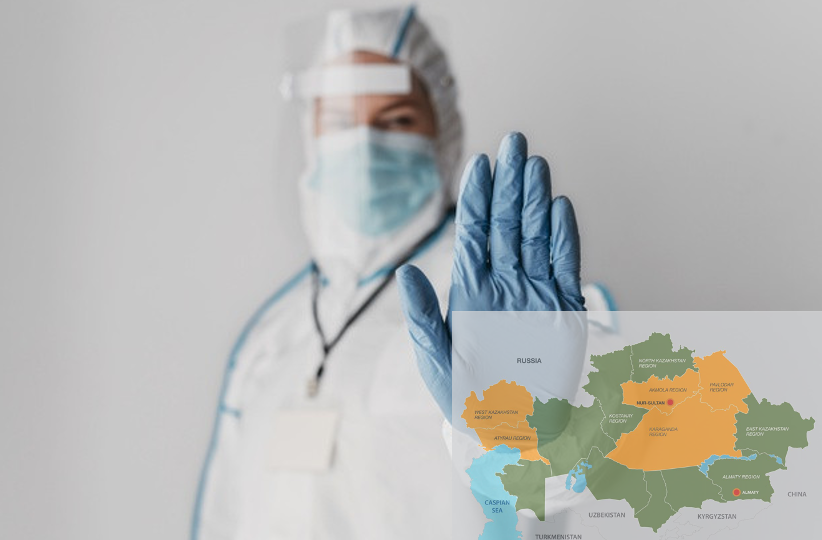NUR-SULTAN – Kazakh capital Nur-Sultan and Kazakhstan’s largest city Almaty re-entered the high-risk red zone. Of 899 new cases registered in Kazakhstan over the past day, 237 are in Almaty and 112 in Nur-Sultan.

The Ministry of Healthcare updates the matrix regularly that affects each region’s coronavirus restrictions. Photo credit: astana.gov.kz. Click to see the map in full size.
As of March 12, the number of Covid-19 cases in the country rose to 221,669. 2,837 people died from coronavirus.
Currently, Akmola, Atyrau, Karaganda, Pavlodar and the West Kazakhstan regions are in a moderate risk yellow zone. All other regions remain in the green zone, according to the epidemiological matrix updated daily by the Kazakh Healthcare Ministry.
Nur-Sultan’s chief sanitary doctor Sarkhat Beisenova explains the rise in cases in the city with the March 8 holidays, people’s visits to crowded places and incompliance with sanitary regulations, including wearing masks.
She said the situation is currently unstable.
“Over the past week, the number of cases is 9.9 percent more than the previous week. The incidence rate is 59.2 per 100,000 of the population, while the R0 value is 1.055. Therefore, since March 10, Nur-Sultan has been in the red zone,” said Beisenova during an online press briefing.
All mass events, including the celebration of the Nauryz holiday March 22, are banned.
The updated decree, however, allowed schoolchildren to study in a traditional classroom at schools with no more than 300 students, and class capacity not exceeding 15 people. Starting March 1, a hybrid learning format will be introduced for schoolchildren in first to fifth grades, and in first to seventh grades in international schools. The capacity of classes should not exceed 25 people.
Computer clubs and bowling centres will resume their work with limited capacity only if they are participants in the Ashyq pilot project that requires a person visiting the venue scan a QR code at the entrance that will show a person’s risk rating based on the government data and her or his history of taking Covid-19 tests.
To address the surge in cases, the Almaty administration also introduced restrictions.
Mass gatherings, including forums, conferences and the celebration of Nauryz, are banned.
Beginning March 13, cinemas and theatres that recently resumed their work will close.
Working hours of cafes and restaurants are restricted from 9 am to 8 pm. Closed-door markets, trade malls, sports facilities and gyms will not be working on weekends.
“We are conducting an epidemiological analysis of proven and potential places where people contract an infection. Among the proven (Covid-19) transmission places are people’s families and households. Because family members, who were diagnosed (with Covid-19) did not isolate themselves and were not hospitalised, they infected 36 percent of those who got sick,” said Almaty’s chief sanitary doctor Zhandarbek Bekshin.
Coronavirus continues to pose a threat and it is only possible to overcome it through vaccination, wrote Kazakh President Kassym-Jomart Tokayev on his Twitter account. “One year ago the World Health Organisation announced a (coronavirus) outbreak. Over this period, Kazakhstan, like the rest of the world, has seen many difficulties. The state has taken decisive measures to protect the lives and health of its citizens,” wrote Tokayev.
The unity and mutual support, he said, helped overcome the most acute phase of the Covid-19 pandemic.
As of March 5, more than 59,000 citizens received the first dose of the Russian Sputnik V vaccine and more than 18,000 of them got their second dose.
The effectiveness of the Russian vaccine, which is injected in two doses in a 21-day interval, is estimated at 91.6 percent, according to the report published in Lancet, one of the world’s leading medical journals, in early February.
The mass vaccination drive that kicked off in Kazakhstan Feb. 1 is currently in its second phase, targeting teachers, professors and police officers. Next on the priority list will be students.
